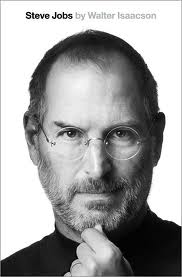 This issue features a review of Steve Jobs by Walter Isaacson, an appropriate choice for an IT company and one that resonates for many working business or other career paths, aiming to make a difference and achieve excellence. Jobs approached Isaacson years ago to write a biography, but the author held back, believing that there was still more of the story for Jobs to live. As Jobs became ill and went public with his condition, his wife approached Isaacson again, and this time he agreed. Laurene Powell, Jobs’ wife of more than twenty years, gave Isaacson permission to write the book honestly, because it was a story worth telling.
This issue features a review of Steve Jobs by Walter Isaacson, an appropriate choice for an IT company and one that resonates for many working business or other career paths, aiming to make a difference and achieve excellence. Jobs approached Isaacson years ago to write a biography, but the author held back, believing that there was still more of the story for Jobs to live. As Jobs became ill and went public with his condition, his wife approached Isaacson again, and this time he agreed. Laurene Powell, Jobs’ wife of more than twenty years, gave Isaacson permission to write the book honestly, because it was a story worth telling.
This was perhaps courageous of her, for anyone who knew Jobs, knew that he could be brutal in his dealings with people. Brilliant, haunted and complex as a person, the book spans the life of Jobs and chronicles much of it in great detail, as the detail-oriented Jobs might have appreciated. Adopted by a working-class couple, Jobs grew up in Silicon Valley, was a prankster at school and showed early signs of high intelligence. When he got in trouble at school, his father never punished him; instead, he let the school know that it wasn’t doing enough to keep Steve engaged and challenged. His parents worked hard to make sure their son had a good education and always supported him. Years later, Steve would find his birth mother, who gave him up when she was an unmarried graduate student and later was briefly married to his Syrian father, also a grad student. They had one more child together, a daughter, the author Mona Simpson. When Jobs found Simpson, in her early twenties and working at the Paris Review in New York, they forged an instant bond that lasted until his death. Jobs and Steve Wozniak, his co-founder of Apple, met while Jobs was still in high school and Wozniak was fluctuating between different colleges.
They bonded based on their interests in technology and pranks, but they were very different otherwise. Jobs was intense and driven, and Wozniak was gentle and uninterested in success. Wozniak credits Jobs with the vision for forming a company and the ability to enchant people with his vision. That element of enchantment is what permeated Jobs’ career, taking him from Apple to Pixar and back to Apple for his greatest moments of creating the iPod, iPhone, and finally, the iPad. What differentiated Jobs from fellow techies of his era, such as Bill Gates, was that he was as passionate about design as he was about the technology. He once took his Macintosh crew to a museum to view Tiffany glass to see how art could be designed for practical use. He would drive others crazy in his quest for perfection, often de-railing projects that were almost finished when he found them to be not quite right and would re-work them until they were. He once recalled how everything that he had done correctly required him to hit the rewind button. In the end, perfection always won. Jobs had an incredible ability to focus and he used that in running a company, especially after his second stint at Apple.
He streamlined the focus of the company, established Apple stores, and concentrated on the few products that are so successful today. This intense focus, however, also allowed him, at times, to ignore or pay less attention to personal issues or family. He was very passionate, which served him well in selling products and winning people over, but it also resulted in emotional outbursts and dealings with people that could be cruel. Yet, he had a loyal following and those who were close to him understood his passion, in all of its manifestations, as a part of what made him tick. His teenage daughter even met with the author to let him know that she understood that her father didn’t have enough time for her, and she accepted that. His son, at Stanford, wants to study medicine and focus on curing cancer, the disease that took his father. His sister, Mona Simpson, gave a heartfelt eulogy of the brother who was sweet and tender and a positive presence in her life. Isaacson writes that Jobs will go down in history as one of the great business leaders of our era, one who combines poetry and technology. “Some leaders push innovations by being good at the big picture. Others do so by mastering details. Jobs did both, relentlessly.” Isaacson’s writing is detailed, all 571 pages, and doesn’t lend itself much to the “poetic” side of Jobs, but as a “story worth telling,” this is a “story worth reading,” and one that will provoke conversation and imagination as to how businesses can move forward in the shadow of Steve Jobs.


